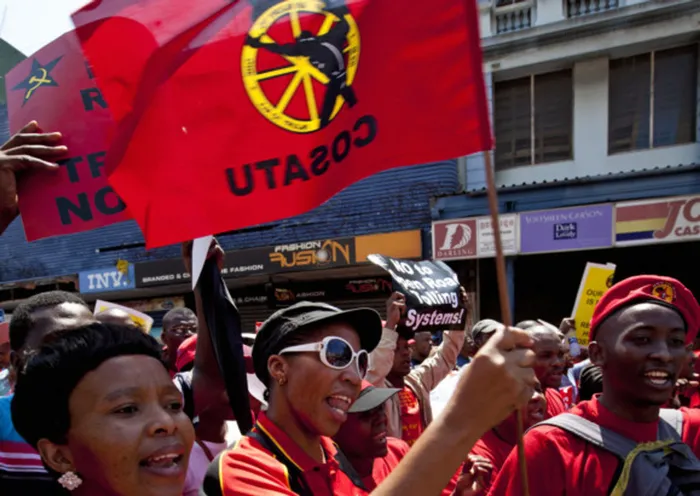Cosatu to fight labour broking

Striking members of the Congress of South African Trade Unions (COSATU) march through the Durban city centre in this file photo. Striking members of the Congress of South African Trade Unions (COSATU) march through the Durban city centre in this file photo.
Johannesburg- The Congress of SA Trade Unions (Cosatu) on Thursday vowed to continue fighting labour brokers.
“Our position on labour (broking) is that it treats workers as commodities, who can be traded to generate a profit,” the trade union federation's second deputy president Zingiswa Losi told reporters in Johannesburg.
“That is why we make no apology for calling it human trafficking and a modern form of slavery.”
Cosatu's campaign against labour broking began in 1999, when it was adopted at the launch of its jobs for poverty initiative, she said.
The parliamentary labour portfolio committee met last week to discuss the Labour Relations Amendment Bill.
The African National Congress said the committee had voted in principle to restrict labour brokers' employment of workers to three months.
If the three-month regulation was agreed to, Labour Minister Mildred Oliphant would specify to which industries it applied.
Cosatu was disappointed that Parliament seemed likely to vote on Thursday to give labour brokers the right to continue to “employ and exploit” workers for up to three months.
However, Cosatu welcomed other amendments to labour laws, which it said were in line with its agreement with the ANC.
These included the principle of equal pay for work of equal value.
It disagreed with views that increased regulation of labour broking would stop abuses.
Cosatu rejected the proposal that after three months the worker had to be hired by the firm he or she was working for.
“Firms will be able to keep rotating workers hired from labour brokers for three-month periods, and then replace them with others,” Losi said.
She said labour brokers were parasites in the employment relationship.
“While they get rich through this trade in labour, the workers are exploited worse than ever, since the hefty proportion of what should have been paid out in wages and benefits goes to the labour brokers.”
She said Cosatu would mobilise “even greater numbers” during protests until the “barbarous practice” came to an end.
Proposed amendments were discussed in the National Economic Development and Labour Council (Nedlac) and agreement was reached on a time-span for temporary employment of six months.
However, the time-span was reduced to three months in Parliament.
Last week, the SA Chamber of Commerce and Industry (Sacci) said it was “disturbed by the tenor” of deliberations on the bill.
“While business commended government on agreeing that (broking) would not be banned, the reduction of the period from six to three months will have the unintended consequence of in effect doing so,” the Sacci said in a statement.
This was because the probationary period for new employees was often three months or longer.
“Sacci is of the view that the result will be a loss of jobs rather than job creation; a situation which the country can ill afford.”
The National Employers' Association of SA (Neasa) is also against the total ban of labour brokers.
“Neasa views this move as detrimental to all of government's efforts to accelerate job creation and reduce unemployment,” said Neasa chief executive Gerhard Papenfus.
Other organisations supporting Neasa were the Free Market Foundation and Business Unity SA. - Sapa